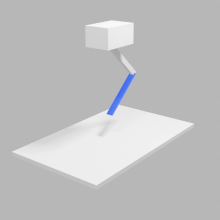Nonsmooth mechanics has emerged as a significant branch of mechanics that deals with systems that exhibit discontinuous behavior such as collisions, impacts, and friction. It has proven to be an effective tool for analyzing the dynamics of complex systems in various applications, from mechanical engineering to natural hazard research. Time-integration methods for nonsmooth mechanics are classically distinguished as either being event-driven or as being event-capturing methods. Since the former is mainly designed for systems with a small number of events and cannot describe accumulation points, we focus on the latter approach.
Based on the seminal work of Jean Jacques Moreau in 1988, a huge number of time-integration methods were developed. However, most of these methods are convergent of order one, even on time intervals without collisions, i.e., the total error decreases linearly with step-size. Moreover, contact penetration and bilateral constraint drift occurs, since the bilateral/ unilateral constraints are enforced on velocity level only. Hence, the numerical solution of nonsmooth mechanical systems with friction requires demanding restrictions on the step-size choice in order to solve the underlying equations with satisfactory accuracy. Higher-order integration methods are therefore a welcome alternative.
Up to now, there is no straightforward extension of higher-order integration methods to nonsmooth mechanical systems with frictional contact and impacts. Nonetheless, a few attempts were made. This project aims to bridge the gap by extending a vast class of higher-order time-integration methods to mechanical systems with frictional contact and impacts. Therefore, well-established methods for the solution of possibly stiff differential algebraic equations (DAE) are extended by frictional contact and impacts. This includes the family of (diagonal) implicit Runge-Kutta methods and nonlinear formulations of the generalized-alpha methods.
One crucial aspect of the proposed methods is their DAE-consistency. In other words, these methods collapse to a higher-order DAE algorithm when dealing with persistent frictional contact, where no collisions occur, and constant sliding states are prevalent. This feature ensures robust and accurate solutions for a wide range of practical scenarios.
Applications
Articles
- Breuling, J., Capobianco, G., Eugster, S. R., & Leine, R. I. (2024). A nonsmooth RATTLE algorithm for mechanical systems with frictional unilateral constraints. Nonlinear Analysis: Hybrid Systems, 52, 101469. https://doi.org/10.1016/j.nahs.2024.101469
- Capobianco, G., Harsch, J., & Leyendecker, S. (2023). Lobatto-type variational integrators for mechanical systems with frictional contact. Computer Methods in Applied Mechanics and Engineering, 418, 116496. https://doi.org/10.1016/j.cma.2023.116496
- Capobianco, G., Harsch, J., Eugster, S. R., & Leine, R. I. (2021). Simulating mechanical systems with frictional contacts using a nonsmooth generalized-alpha method. Proceedings in Applied Mathematics and Mechanics (PAMM), 21, e202100141:1–3. https://doi.org/10.1002/pamm.202100141
- Capobianco, G., Harsch, J., Eugster, S. R., & Leine, R. I. (2021). A nonsmooth generalized-alpha method for mechanical systems with frictional contact. International Journal for Numerical Methods in Engineering, 122, Article 22. https://doi.org/10.1002/nme.6801
Kontakt

Jonas Breuling
Dr.-Ing.
Remco I. Leine
Prof. Dr. ir. habil.Direktor


